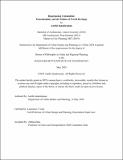Repurposing Colonialism: Postcoloniality and the Politics of World Heritage
Author(s)
Janakiraman, Aarthi
DownloadThesis PDF (114.6Mb)
Advisor
Vale, Lawrence J.
Terms of use
Metadata
Show full item recordAbstract
Since the turn of the 21st century, countries in the Global South have increasingly sought to inscribe their heritage sites on UNESCO’s World Heritage List. World Heritage listing is considered prestigious because it brings global recognition, secures political legitimacy, boosts tourism, and attracts economic investment. Within the Indian Ocean Region, many nations continue to seek World Heritage status for their colonial heritage, despite a painful history of decolonization coupled with rising nationalist sentiments, raising the question: how does highlighting colonial-era heritage as World Heritage serve postcolonial societies?
Through a transnational comparative study of colonial-era World Heritage sites in South and Southeast Asia, this dissertation examines diverging approaches to postcolonial nation-building using colonial-era heritage. While all forms of heritage are instrumentalized in furthering nation-building agendas, I argue that the production of colonial-era World Heritage serves three distinct uses for postcolonial societies: to signal modernity, manage ethno-racial politics, and preserve elite privilege. Through this triad of uses, I demonstrate how spatial manifestations of colonial power are coopted by different actors and legitimized through global institutions to further the present-day agendas of postcolonial elites. Considering nation-building through the lens of heritage reveals the lived inequities and power structures of postcolonial societies that are preserved through urban conservation.
This dissertation probes the role of colonial-era heritage in postcolonial societies through an in-depth consideration of two comprehensive case studies – the Singapore Botanic Gardens, and the Victorian Gothic and Art Deco ensemble of Mumbai. Using a version of Mukhija’s (2010) N of one plus some approach – here an ‘N of two plus some’ approach—I also examine Old Town of Galle and its fortifications in Sri Lanka, and Georgetown and Malacca Historic Cities of the Straits of Malacca in Malaysia, as secondary cases to add richness and inspire ways to question the primary cases by situating them in relation to others. Drawing from 10 months of fieldwork conducted over a period of two years, I combine evidence from semi-structured interviews with field observations, critical spatial and visual methods, as well as document and media analysis. Bringing together scholarship on urban design with critical heritage studies, ethnic studies, and international development, I explore a typology of colonial-era heritage practices in constructing the postcolonial nation.
Date issued
2024-05Department
Massachusetts Institute of Technology. Department of Urban Studies and PlanningPublisher
Massachusetts Institute of Technology